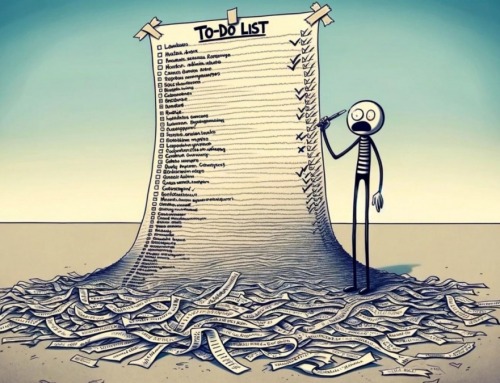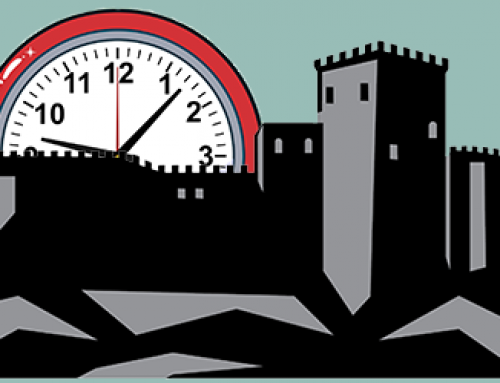Here’s how to gain some control over your days by gaining some perspective and making weekly planning a habit. The truth is, weekly planning seems difficult right now—especially since we’re taking life a day at a time at the moment. Just staying in the moment and going with the flow takes all of our energy and focus.
We’ve had bigger and more urgent things to deal with. I mean, seriously, can you even remember what your New Year’s resolutions were anymore? Are your goals even relevant now? The current national/global situation can’t last forever and eventually a new normal will evolve. The past three months have proven that when you think you’re at the end of something, you’re actually at the beginning of something else.
If you change the way you look at things, the things you look at change.
But this time around, you can begin to figure out what the “something else” will be like for you. The first thing to do is to gain some perspective. To help reflect on the past three months ask yourself the following:
- What are the first thoughts that come to mind about past few months? Mostly positive, negative, or neutral?
- What was one of the most interesting things I’ve learned so far?
- Who was one person I met that I’d like to get to know better? Why?
- What was one of my most challenging moments? Why?
- What was one of my favorite accomplishments?
- What was one personal strength I used this quarter? How did it benefit my work or life?
- What hurdle came up more than once? (time, money, attitude, location, knowledge, etc.)
- How well did I communicate with the people who matter most to me?
- What three events or accomplishments were made possible by the help of others?
- What advice would I offer someone else on the basis of a lesson I’ve learned so far?
- What are three problems that came up at work? How did I approach solving those problems? Are there any trends in those problems or solutions?
- Who needed my encouragement this quarter? What did I say or do to help them along?
- If I were writing a memoir, what would I highlight in the chapter about this quarter?
- What was I doing when I forgot about time and was able to be “in the zone”?
- What frustration seemed to come up again and again?
- What did I start and not finish?
- What did I try and fail?
- What three things am I curious to know more about?
- If I could wave a magic wand and master one skill, what would it be? Why?
- Who is one person I could help right now? How? What would it “cost” me? What would I gain?
- When did I slow someone else’s progress? Why? What was I worried about?
- What’s one thing I made or created from scratch? How did that feel?
- What’s one thing I did that left me exhausted at the end? How did that feel?
- What’s one thing I was a part of this quarter that I’ll remember for the rest of my life? Why?
- What was the nicest thing someone did for me?
- What was the nicest thing I did for someone else?
- If I could change one thing that happened, what would it be?
- What felt difficult last year ago that now feels easy (or easier)?
- Of the books I read this quarter, which was my favorite?
- How did I capture my thoughts and feelings? (journaling, writing, social media sharing, talking one-on-one with friends or family, etc.) Was that method helpful?
- What are six adjectives that best describe this quarter? What would I like those adjectives to be next quarter?
Start the habit of weekly planning.
A critical link between what you dream of accomplishing and what you actually accomplish is forged in a weekly personal summit—in other words, a meeting that you hold with yourself. Set aside a specific time in a quiet place each week to evaluate your past week, and preview (organize and plan) the week ahead. This is the moment of clarity where you can gain perspective about the roles you play in life (boss, student, spouse, artist, parent, etc.) and your personal goals become the primary influencing factors as you plan the activities you’ll do each day. Rather than simply planning out the week based on what happens to be in front of you at the moment, you proactively (take the initiative) determine which hours during the week will be investing in the things that you’ve decided are most important.
Here are some ways to make the most of your weekly plan:
- Review and write down your roles for the week. You live our life in terms of roles—not like “role-playing,” but in the sense of authentic parts you’ve chosen to fill—such as manager, mom, softball coach, wife, student, etc.
- Think of your long-term goals in each role, and ask yourself, “What are the one, two, or three key things I need to do that role this week?”
- Transfer each of those key activities onto a specific day and time of the upcoming week. Make that activity as an appointment with yourself.
- Review and evaluate previously-made and repeating appointments and commitments and consider other activities you may want to plan into your week.
- Transfer those items onto your calendar.
Without weekly planning, you’ll spend your days reacting to the demands of the day instead of feeling in control of your schedule. Anything that increased your perception of control over a situation—whether it actually increases your control or not—can decrease your stress level and make your week productive.
Plan your coming week.
These are bold questions to motivate you to set goals that will stretch and strengthen you. Let your answers scare you a bit—your goals should both scare and excite you. Set a goal that you can’t achieve until you grow into the person who can.
- What will I do this week that I’ll talk about for the rest of my life?
- What results do I want to see by the end of the week?
- Will I go as far as I am able?
- Is this a big enough challenge?
- Am I bold enough?
- What’s one or two things I could do this week that would make a tremendous positive difference in each of my life’s role?
- What’s the most exceptional thing I will do this week?
- What can I do this week that no one will expect from me?
- What will stand out for me?
- How did I go against the crowd?
- What real difference will I make to the people around me?
- Is this the best I can give?
- What will empower me to accomplish these goals?
- What challenges will I encounter?
- How will I overcome those challenges?
Final steps: planning, prioritizing, scheduling
The next step in your weekend session is to break each goal into action items—list all of the activities and put them in sequence. Force yourself to prioritize each activity to ensure you’ll have the time to accomplish your most important items. Decide how much time each activity will require—and begin to transfer your prioritized activities to specific times during the coming week on your calendar. Assigning work to specific times reduces the urge to procrastinate—you no longer have to decide what to do during a given period—the decision is already made!






